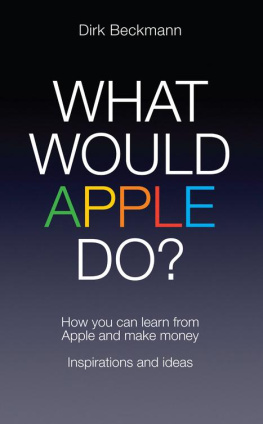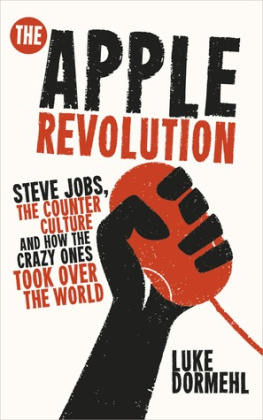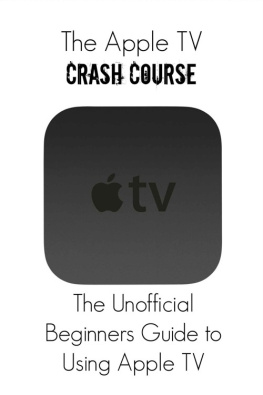T his book is not meant to be a technical work and it is not an insider story. I am not connected to Apple in any way, and have neither worked for Apple nor received any payment or gratification.
W hen I started work on the German version of this book in 2010, the iPad had just been launched. Steve Jobs was at the peak of his creativity and Apple had not quite yet become the most valuable listed company in the world.
With the iPad, Apple pulled off a coup that equalled or even surpassed the launch of the Macintosh in 1984. With the iPad, Apple heralded the post-PC era. Of course, the device was at first ridiculed by industry experts. But Apple already had the market clout to convince its customers practically overnight that when it came to writing emails, reading or surfing the Net, the cumbersome PC had had its day.
Now, in mid-2013, the world has changed yet again. Apple is the worlds most valuable listed company and Steve Jobs is no longer with us. The market has been flooded with books about the Apple founder, among them a particularly worthwhile biography by Walter Isaacson.
In the last two years, Apple has not been able to herald any new revolution comparable to the creation of the post-PC era, and has concentrated instead on consolidating its market dominance. Some experts claim that Apple has become a supply chain company: a firm that knows how to design desirable products , produce them cheaply in the Far East and sell them at an inflated price.
In the final quarter of 2012, Apple made around $1 billion profit per week, but was still punished by the stock exchanges. Despite growth in sales, the share price fell at an alarming rate. Steve Wozniak, the co-founder of the organisation, was already warning that Apple must be careful not to lose its cool factor as a brand.
More than once in the thirty-plus years of its existence, Apple has been pronounced dead. Now, once again, the company has a great opportunity to prove otherwise. Despite declining popularity among the so-called multipliers, early adopters and evangelists, and what hard-core fans saw as disappointing product presentations in the last two years the companys latest innovations failing to match the calibre of the iPad Apple is in the pole position and is still capable of revolutionising a number of markets. This is particularly true for the television market, if the numerous rumours about an Apple TV are to be believed.
No matter what the people at Cupertino in California are conjuring up at the moment, the developments are always exciting to follow, especially if you are an entrepreneur wondering how to deal with the digital shift.
Following the German first edition, I have revised this book extensively, leaving out Google and other competitors to concentrate exclusively on Apple.
The text is deliberately short and focused. If theres one thing you can learn from Apple, its to focus on whats really important and to leave out the rest.
The first section of this book highlights three areas where you can learn from Apple: Apple has a special mindset, a unique way of doing things, and sells its innovative products by means of what is probably the best communication strategy in the corporate world.
The second section demonstrates how Apple methods can be applied to other industries. If the Apple mindset, development methods and communication strategy were to be used to create, for example, an automobile, it would be different to anything ever seen before. A kitchen would function in a completely different way and toys would provide a whole host of new possibilities to both parents and children.
This book is aimed at anyone who wants to develop their products or services and position themselves in the digital market. It is intended for all people who face the question of how to realign their products, services, processes and communication for the digital age.
A ll received wisdom would say that theres no way Apple could be successful because it completely ignores conventional business practices. It serves a wide variety of different markets and operates in a proprietary, integrated technical world. The investment in R&D is mind-blowing. The employees develop innovations in interdisciplinary teams with an enormous amount of effort, but then go on to find fault after fault in their own ideas. All information about new products is kept top secret (and top secret means top secret) right up to the launch. When you think about how little Apple takes ordinary business principles to heart, you realise that any potential investor would normally refuse to give this firm a single dollar.
But Apple doesnt need investors, and its doing just fine without them. Since 1997, the company has been able to increase its stock value to a higher level than that of Google, Microsoft or Facebook. Since 2011, Apple has been the worlds most valuable company. With products such as iTunes, iPod, iPhone and iPad, Apple not only makes an enormous profit, but has also opened up completely new markets.
The Apple system takes markets by storm and represents a combination of modernity, lifestyle and quality. However, the best bit for the company and its shareholders is this: Apple is making money. The company is profitable in every field.
So what makes Apple so successful? The answer used to be: the company is blessed with a charismatic boss who seems to succeed in everything he does. Someone whose keynote speeches are the inspiration for thousands of speakers. Someone who makes one ground-breaking decision after another.
But today we know that Apple is so much more than just Steve Jobs. Apple is a concept. A concept that is well worth learning from because it represents a company with a reputation for overcoming seemingly invincible obstacles to create great new things. A company that chases up seemingly crazy ideas and will not rest until it has put them into action, and which keeps finding new opportunities to make money in the digital world. Loads of money were talking (in early 2013) about $130 billion in cash.
So what makes Apple the greatest innovator in the digital world right now? How has this company, whose products are shunned by professional users as lifestyle gadgets, and often labelled as too expensive, come to be the most innovative of all technology brands? What have products such as the iPhone or the iPad got that sets them apart from their competitors? What did Apple do to become such a global phenomenon?
The way in which Apple takes business models from the analogue world and modifies them for todays digital world has become another important keystone of its success. It creates new markets using business models that were unthinkable in the old days: a perfect example of digital evolution from a businessmans point of view. The success of iTunes and the iPod was only possible because Apple threw out well-worn mindsets, concentrating instead on putting a brand new business model into action.
While the music industry completely failed to anticipate the digital revolution, Apple decided to talk with the record labels about developing a digital sales system for music. Lengthy discussions and a great deal of persuasion were necessary. But it worked, and today the labels generate a significant share of their income through the worlds largest music vendor Apple. The legal and technical barriers appeared insurmountable and scared everyone else off from even trying to move in the direction that Apple was taking. No one believed that customers would ever go back to paying for something that was available for free and only a few clicks away. Before iTunes, it was practically impossible to purchase music legally from the Internet. Yet today the quick-and- easy-to-buy music files from iTunes are seen as a cheap alternative to the traditional CD. Being able to download individual songs for seventy-nine pence and purchase albums for a standard fixed price has become the norm for the entire music industry.











